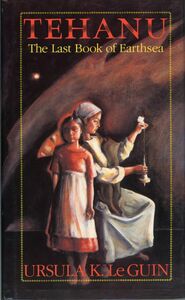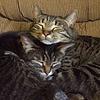Take a photo of a barcode or cover
adventurous
emotional
hopeful
inspiring
medium-paced
Plot or Character Driven:
A mix
Strong character development:
Yes
Loveable characters:
Yes
Diverse cast of characters:
N/A
Decades have passed since Tenar came to Gont from Atuan, and she's now a mother and a farmer's widow. Now that her husband is dead and her children gone, Tenar tries to understand her place in the world, and the place of women in society. She has also adopted a mysterious little girl, Therru, who has suffered from many forms of abuse and is now a silent, deformed child.
Meawhile, Ged is coming back from his journey to the Dryland after spending his power to save magic and Earthsea, dropped off by the dragon Kalessin. He finds himself an ordinary, middle-aged man, and the transition from Archmage to Mr Nobody is very tough. Good thing he can count on Tenar to support him through his mourning. This book is written in Tenar's perspective, and she notices his struggles...
Yet, Ged plays a very minor role in this book. He becomes a vulnerable, very relatable and powerless man, but also a secondary character.
This book is about fear and about power. It's about friendship and love. Sacrifice and commitment. But first and foremost, this book is about the inequalities that women face in Earthsea (and in our world). Le Guin wrote this book about 20 years after The Farthest Shore, and one can tell that she has reflected on her stories extensively, particularly around the themes of injustice and feminism. After three books highlighting the power of men (even in The Tombs of Atuan, where women work to serve men of power), Tehanu brings a whole new perspective to the world of Earthsea.
The setting is simple, the adventures not nearly as epic as in previous books. The book barely fits in the fantasy genre, but it doesn't matter: Tenar and her reflections on power and gender inequalities are brilliant, and I didn't get bored a second reading her thoughts and adventures. Like in our society, Earthsea's cultures are sexist. Women fear their own power and men do so even more, forcing their wives and daughters into stereotypically powerless roles. Even when it comes to magic.
How does a woman find freedom in that kind of world? Maybe not by trying to be or act like a man, but by finding and wielding her own power. Tenar may not be a wizard or even a witch. Yet, Kalessin talks to her like to a Dragonlord, which fuels her thoughts on her own power:
Tenar's struggles as a (middle-aged) woman, as a foreigner, and as the adoptive mother of a child who is considered an abomination, made for a touching and thought-provoking read. Why 3 stars, then (let's say 3.5)?
For two reasons. First, I think this story would have been even more interesting if told partially or completely through the eyes of Therru. So far, each book in the series was told from a different character's perspective. In this case, we slowly get to know that Therru will play a major role at some point, yet she stays in the background. I felt frustrated, because I was led to believe she would blossom into a major, powerful character, and she only does so in the last few pages. This makes Tehanu seem like a pre-story, some kind of explanation that we need to read to get to the heart of the real story. But the heart of the real story isn't addressed in Tehanu. That brings me to the second reason I didn't give this book a better rating. The ending felt rushed and "too easy". I expected a lot more after so much build-up, but it fell flat for me, it felt incomplete (not in a good way). I'm glad there is a next book, because this would have been a poor ending for such an amazing saga. I'm looking forward to reading Therru's adventures in The Other Wind.
Meawhile, Ged is coming back from his journey to the Dryland after spending his power to save magic and Earthsea, dropped off by the dragon Kalessin. He finds himself an ordinary, middle-aged man, and the transition from Archmage to Mr Nobody is very tough. Good thing he can count on Tenar to support him through his mourning. This book is written in Tenar's perspective, and she notices his struggles...
Looking at him in the dusky light to see how he took this, she wondered sharply for a moment what it must be like never to have feared a human being, what it would be like to have to learn to be afraid. (p. 453)
Yet, Ged plays a very minor role in this book. He becomes a vulnerable, very relatable and powerless man, but also a secondary character.
This book is about fear and about power. It's about friendship and love. Sacrifice and commitment. But first and foremost, this book is about the inequalities that women face in Earthsea (and in our world). Le Guin wrote this book about 20 years after The Farthest Shore, and one can tell that she has reflected on her stories extensively, particularly around the themes of injustice and feminism. After three books highlighting the power of men (even in The Tombs of Atuan, where women work to serve men of power), Tehanu brings a whole new perspective to the world of Earthsea.
The setting is simple, the adventures not nearly as epic as in previous books. The book barely fits in the fantasy genre, but it doesn't matter: Tenar and her reflections on power and gender inequalities are brilliant, and I didn't get bored a second reading her thoughts and adventures. Like in our society, Earthsea's cultures are sexist. Women fear their own power and men do so even more, forcing their wives and daughters into stereotypically powerless roles. Even when it comes to magic.
Both manhood and magery are built on one rock: power belongs to men. If women had power, what would men be but women who can't bear children? And what would women be but men who can?" (p. 527)
How does a woman find freedom in that kind of world? Maybe not by trying to be or act like a man, but by finding and wielding her own power. Tenar may not be a wizard or even a witch. Yet, Kalessin talks to her like to a Dragonlord, which fuels her thoughts on her own power:
[I] was taught that to be powerful [I] must sacrifice. Sacrifice [myself] and others. A bargain: give, and so get. And I cannot say that that's untrue. But my soul can't live in that narrow place – this for that, tooth for tooth, death for life... There is a freedom beyond that. Beyond payment, retribution, redemption – beyond all the bargains and the balances, there is freedom. (p. 525)
Tenar's struggles as a (middle-aged) woman, as a foreigner, and as the adoptive mother of a child who is considered an abomination, made for a touching and thought-provoking read. Why 3 stars, then (let's say 3.5)?
For two reasons. First, I think this story would have been even more interesting if told partially or completely through the eyes of Therru. So far, each book in the series was told from a different character's perspective. In this case, we slowly get to know that Therru will play a major role at some point, yet she stays in the background. I felt frustrated, because I was led to believe she would blossom into a major, powerful character, and she only does so in the last few pages. This makes Tehanu seem like a pre-story, some kind of explanation that we need to read to get to the heart of the real story. But the heart of the real story isn't addressed in Tehanu. That brings me to the second reason I didn't give this book a better rating. The ending felt rushed and "too easy". I expected a lot more after so much build-up, but it fell flat for me, it felt incomplete (not in a good way). I'm glad there is a next book, because this would have been a poor ending for such an amazing saga. I'm looking forward to reading Therru's adventures in The Other Wind.
challenging
reflective
medium-paced
Plot or Character Driven:
Character
Strong character development:
Yes
Loveable characters:
Yes
Ursula Le Guin has long been one of my favorite authors. The Dispossessed is quite possibly my favorite science fiction novel. However, I have never been satisfied with how she wrote women. I recall being troubled by her treatment of the female characters in some books, such as The Lathe of Heaven, and puzzled by the almost complete absence of female characters in others.
In Tehanu I am finally satisfied. This is a book about women, and they are fully developed characters who are not filtered through the lens of Le Guin’s concept of the male gaze. And what excellent, complex characters they are. A very fine book.
In Tehanu I am finally satisfied. This is a book about women, and they are fully developed characters who are not filtered through the lens of Le Guin’s concept of the male gaze. And what excellent, complex characters they are. A very fine book.
It was odd to read this and feel like the character was the same as one from the short story "Dragonfly" in "Tales From Earthsea" and yet still know that it can't be the same person. Guess that's one thing about reading these out of order.
Not enough Ogion. Never enough Ogion.
Not enough Ogion. Never enough Ogion.
La relació entre la Tenar i la Therru és de les coses més tendres que he llegit
adventurous
emotional
fast-paced
mysterious
slow-paced
adventurous
mysterious
tense
fast-paced
Plot or Character Driven:
Plot
Strong character development:
Yes
Loveable characters:
Yes
Diverse cast of characters:
Yes
Flaws of characters a main focus:
No
Grown up and deeper compared to the previous 3 novels
adventurous
challenging
mysterious
reflective
tense
fast-paced
Plot or Character Driven:
A mix
Strong character development:
Yes
Loveable characters:
Yes
Diverse cast of characters:
No
Flaws of characters a main focus:
Yes
dark
emotional
reflective
sad




